If nothing else, it would be interesting.
Our first hint that something would be going into that stretch of the Ravenswood Corridor was a little over three years ago, when Center Square Journal dropped hints that a “major chain” brewpub might be opening at Lawrence and Ravenswood. We asked Alderman Pawar about that a few months later, but got nowhere.
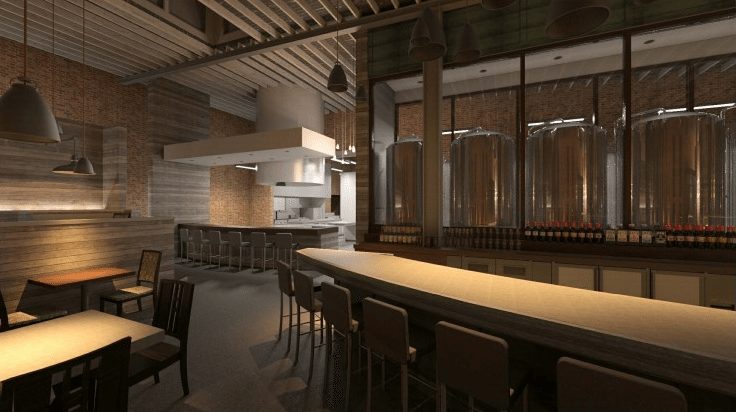
Then, we stumbled across these plans on the Chicago 47 site showing a sleek, clean interior with a 10bbl brewing system. Then we sussed out that the brewery in planning was from a couple Alinea vets, one of whom spent years at Half Acre. Then we found that they bypassed River North and Randolph Street to stay in Ravenswood. That was pretty cool of them, we thought.
Then we kinda heard nothing for a long while.
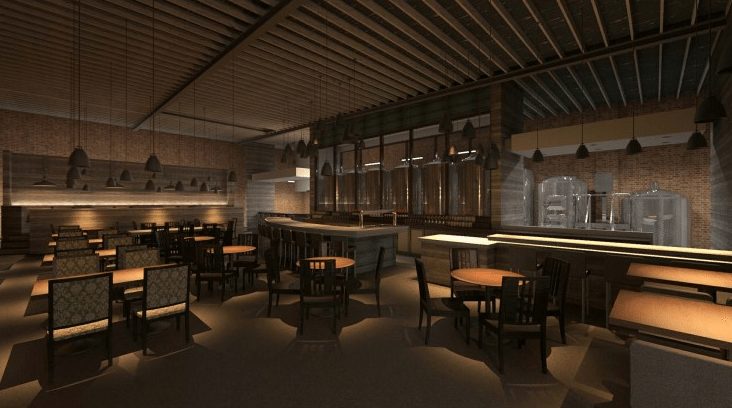
Things picked up again in recent weeks as the “culinary brewhouse” began readying for opening.
I recently visited for a quick tour and conversation with brewer Michael Carroll, who showed me a space that looks surprisingly like the above renderings. The brewhouse is a little more hidden behind some walls, but the floorplan, the bar section, even the big ol’ open kitchen and grill area all in place.
During the walkthrough, fellow Bohemian and former Alinea sommelier Craig Sindelar explained it to me thusly: “What we’re doing isn’t completely normal, even though it’s not not normal. Does that make sense? What we are doing is we are making food, and we are having good things to go with it.”
Carroll repeated the sentiment to me a few times: “We’re a restaurant that makes beer.”
It’s true — this is not normal for the neighborhood. It’s not normal for a traditional brew pub. It’s not normal for a restaurant that’s coming from two people with fine dining backgrounds. It’s not normal for a brewpub to also have a full wine and cocktail program and a big ol’ wood-fired grill.
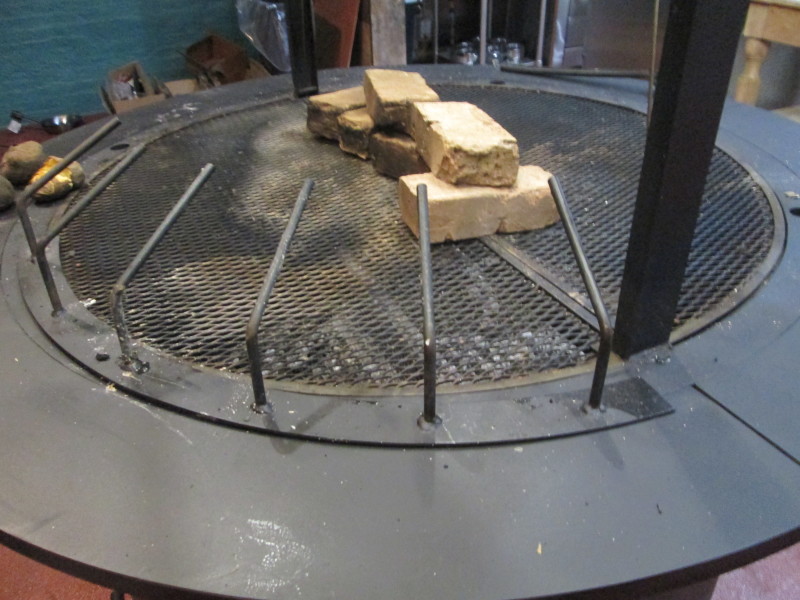
That’s the grill.
It’s not normal for a brewpub serving food to not have one single fryer on site. No mozzarella sticks or buffalo wings here. (That may honestly be the most mindblowing part, to me.)
What it is, or at least appears to be at the moment, is an interesting mash up of all of the above, which is another reason why I have been pretty intrigued over the course of the past three years.
Chicago has been edging into the marriage of fine dining and elevated brewing for a while now, but this is the first local concept to really kick that door wide open. With the rest of the team hailing from other elevated places like El Ideas and the Brixton and Acadia, this is not a place where you should expect an experience that starts and ends with a bag of pretzels and a pint of pale ale.
Band of Bohemia is now open, and we look forward to seeing what they can do. Here’s our conversation about beer, restaurants, bread, and more:
GDB: How long did you spend at Half Acre?
Michael Carroll: Just over three years. This was just after [Alinea]. I was a bread baker at Alinea, amongst other things. I was at front of house, but also a bread baker. Then I was leaving there anyways and came across Half Acre.
GDB: This was in 2009-ish?
Michael: Yes, 2009. They had just been open, they had that space for just about a year. I think it was just over a year when I came by. Phil Wymore was still there. It was just…five of us. The shop hadn’t opened yet. They were just brewing, and there I came. My first couple days there I was just pushing a broom, actually the first couple weeks, if not a month… Just did random odd jobs.
They’ve changed it now, but it took a lot of time to get there. I was there from a fairly early stage. We’ve learned a lot from there, which is nice to do. I’ve learned it with them. They didn’t really know what they were doing at the time either.
GDB: So, it wasn’t the nonstop Daisy Cutter machine yet?
Michael: No, I mean we still do a lot of Daisy Cutter at that point. The first year I think they did 900 barrels, which is tiny compared to what they did right before they got to the Balmoral space. I was there for the entire growth, a lot of construction, a lot of growth which was a really fantastic thing to have seen. It allowed me to see how the things grow, how they move, learning from my mistakes, making mistakes and it not being a big deal, because everyone there made a mistake of some sort. But it all worked out, we all learned from it, it was a really cool experience.
GDB: What kind of beers did you get to take the lead on doing over there? And what I’m really curious about is, was any of that informed by your time at Alinea? Because making bread and making beer…there’s a lot of real direct cross‑overs between them. What kinds of things did you take from one to the other?
Michael: Well, they’re both grain, they’re both water, they’re both yeast and they both have a flavoring of some sort. How it works is very simply…I guess it’s not that simple. The first bread I ever made was Orange Chicory Rye. First beer I made at Half Acre was called The Empty Sea, also Orange Chicory Rye. One of the first ones on this list is also Orange Chicory Rye.
A lot of the stuff I did baking wise does translate to this. Some things don’t work, but some certain obvious things don’t work, like cabbage. [laughs] They’ve talked me out of doing it. I might do a barrel aged version with something like sauerkraut. I don’t know if that would work, and people might hate me for it, make the place stink to high heaven, but it could be good in the right food aspect. You never know.
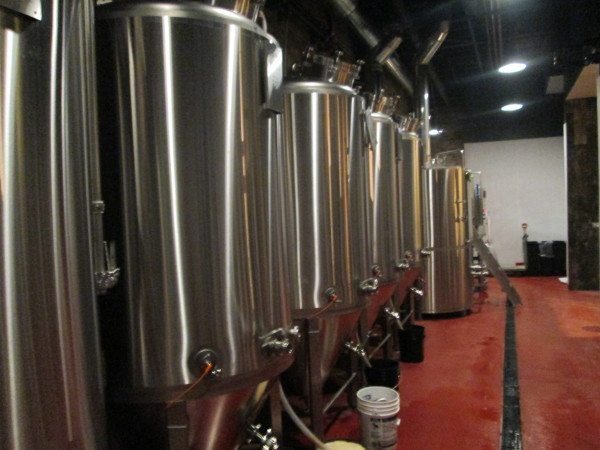
A parade of five fermentation tanks on one wall…
GDB: Put it in FoBAB and someone will tick it at five stars.
Michael: Yeah, exactly! Yeah, and all you really need is one person to love it, it’s all good. A lot of the stuff I did baking wise does translate, and at Half Acre they let me stretch my legs a little bit. I’ve done a couple of cool things with them, couple of beers for Next. I think I did four, three or four, I think for them.
[That] also helped continue to spawn of the idea of this, or at least make the realistic approach to making beer to eat with nicer food, instead of just fried food. Because it can be more than that, which again, is great. I eat plenty of fried food. [laughing] But it doesn’t have to be that in this sort of a setting.I might do a barrel aged version with something like sauerkraut.Michael Carroll
GDB: Do you cook as well?
Michael: Yes. Not here, necessarily, but I do grill [laughs] . I have just about 20 years of cheffing experience. Graduated at the New England Culinary Institute. Couple other random spots that I’ve worked at that I’m trying to think of.
GDB: Yeah, because you don’t just drop into Alinea and start baking bread out of nowhere.
Michael: That’s right, yeah. I worked for Thomas Keller at one point, Cory Schreiber in Wildwood, in Portland. Great place. American Seasons on Nantucket, fantastic little spot by the way.
GDB: I’ve found that people who make beers like this and make beers with flavor combinations that you wouldn’t expect often times have a real strong restaurant and culinary background. Jared at Moody Tongue is probably the foremost example out there right now. There are also a couple people, one in specific in Michigan I’m thinking of [Brewery Terra Firma] that is the same thing.
Michael: The whole part of it is just flavors, is all it is. Once you understand flavor then you can translate to other things. Translate it if it’s the food world, if it’s the beer world, if it’s the baking world, whatever kind of world. It always relates to another.
GDB: Did you go to Half Acre with the intention of doing something like this on your own or did you just want to break away from food for a little while?
Michael: I’ve always wanted to do this since I started brewing. The idea originally was to have a farm house. Nice food, make some beer, have little pigs, have all your chickens and all of that stuff. [laughter] That was way the original idea. That still exists, so this is a good jumping off point for anything else I might do, if I do anything else.
GDB: How did it land on this place with this team then?
Michael: A lot of it had to do with the finer dining aspect of it. Working in a place like Alinea, I think going humbly enough to a place like Half Acre, which it was…I wouldn’t say it was one extreme to the other but it was definitely a different job. All the while, though, I always have more of a finer-dining love. I love going to places like Next or Alinea to eat, not that I go there often because it’s not exactly cheap.
I like that aspect more than not. Doing this was nicer. The food aspect was also nicer. The beer aspect was also going to be nicer, dare I say. Then I got together with Craig who had a similar idea and we both discussed it one day. They both aligned very well, we said, “let’s just do it.” We got a business plan and then from there we kept plugging away into the business plan and kept on at it.
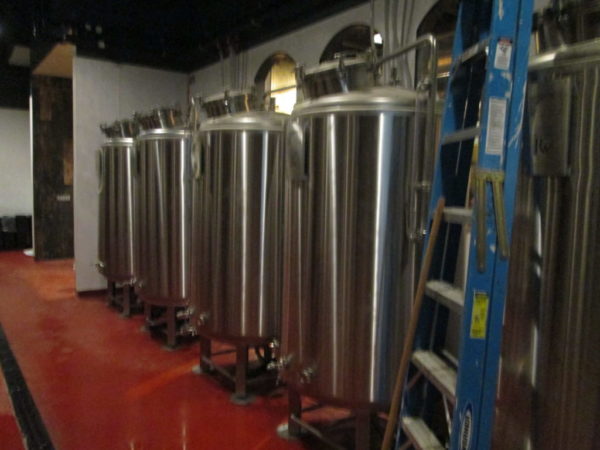
…and serving tanks closer to the bar on the other.
GDB: Do you work with Craig on any of the beers? I’m curious about what a top‑level sommelier does at a brewpub.
Michael: He will taste them and agree with it or not. The other part [is] he knows my beers as well from what we had done at Next. He was a part of one of them and knew what was going on with the other one.
He was a Half Acre fan as well. He lived down the street. He would come in a lot and try out the beers, and anything else I had he would want try it. He liked them all to trust my palette enough to make something that works out well, hopefully.
He accepts it, I guess. Likes it, accepts it, I don’t know what is the best way to put it.
[laughter]GDB: But you’re saying there is no… “Why don’t you make one of these, to go with this?”
Michael: No, not yet. We will get to that especially when it comes to the chef as well because when I did things for Next, I am using that as an example because that is the easiest one, mainly what I’ve done it for.
The food came first at that point. I had to make a beer that went with it. The same thing with the bread world was, the food came and then I had to figure out the bread that was paired with the food. I was used to doing it that way and then doing it here, I have the luxury of thinking about food and then making a beer.
I always think about food first. And then what would go with that. Eventually it will probably go the other way where the chef has an idea, like, “I’ve got a couple great dishes, have you got a beer that would go with this, this and this?” I could make that happen.
Here, I have the luxury of thinking about food and then making a beer.Michael Carroll
GDB: Talking about menus and fine dining — have you talked about presentation at all? It’s going to be like an à la carte menu or is it going to be a tasting menu?
Michael: It’s a tasting menu that you can do à la carte. The menu itself is constructed, it’s basically each beer goes with a number of dishes, for example, roasted beet and thyme. Let’s use that as an example because it’s the easiest one.
If you think of roasted beets, what can you have with a roasted beet? If you have a beet salad with it, goat cheese, it’s arugula. It’s a bit of lime you can taste. You can make a dish that’s surrounded by that. You don’t actually have beets in your dish, you have beets with the beer and the rest of it’s in the dish, if that makes sense.
So, all the beers itself are meant to translate to a number of food items underneath it. What we do is, for the three main beers, you can then pick one from each category.
GDB: Kind of make a three-course experience.
Michael: Yes, and after three courses, then dessert, good to go. If you want to just have an appetizer, each one’s about appetizer size and you could just have one. One from each, you could have three from the same beer category, whatever. You can mix and match it.
As a table you can each have one, go back and forth. That’s one of the things for the service part of it, we’ll figure out and let people understand what you have to do. Because we’ve never done this before so, and it’s one of those things where it’s hard to explain it because it doesn’t necessarily exist, but once it does exist people will then understand it.
https://instagram.com/p/7-wtHJrwgP/
GDB: I know you guys have been working on this for a long time. But just in the last, say, 18 months, they’ve been talking about a Rick Bayless brew pub for a long time now. You’ve got Jared Rouben, who does culinary brewing but came from fine dining, Chef Cantu [RIP] was going to go from really fine dining into the brewery world….
It seems like all of this seems to be happening right at this one time.
Michael: That’s just the world and the universe. That beer is finally ready, or people are finally ready to accept it and move on. You can get to a point where if you get tired of the same thing and there’s just the next step that nobody’s taken and now they’re starting to take it.
I mean it’s evolution, and I think we’re finally ready for it. Chicago’s great for it too — it’s an adventurous food town, liquor town, beverage town, wine town, Chicagoans like to try different things, which is nice.
GDB: I mean, this room could’ve been wood paneled with taxidermy on the walls and been a total straightforward beer hall…
Michael: Could’ve been.
GDB: But it doesn’t look like that now.
Michael: Band of Bohemia! It’s meant to be a little more…I don’t know, what would you say Band of Bohemia would be décor‑wise?
Craig, from across the room: Bohemian?
[laughter]Michael: There you go, good answer. So it’s more bohemian. [laughter]
https://instagram.com/p/-AamQJAdVY/
GDB: Do you feel any sort of pressure because of your combined background? The story is going to be that this is kind of “Alinea plus Half Acre.”
Michael: Not really.
GDB: Your team’s collective experience in fine dining does sort of set up a certain kind of expectation.
Michael: We’re old enough and hopefully mellow enough at this point to where we just do what we do and not worry too much about it and hopefully it just works out. The first beer on the system I had to get it right. But I figure at the same it’s a brewing system. Its beer, I’ve done it however many times beforehand….we’re realistic about what we’re doing and we’ve been around the block a couple times and hopefully it’ll work out.
GDB: This isn’t like where someone that has been home brewing for three years and his family said he makes a good stout, and six months later he’s open in a strip mall somewhere.
Michael: It’ll be great if somebody could do that. But it’s not that, we’re definitely seasoned veterans in the restaurant industry in general. I’ve been in for 20-plus years, he’s been in for 20-plus years, the chef’s been in for 15‑ish plus, I forget when he started. We’re not green, basically, but we’re green at opening our restaurant.
The opening part is one thing, but it’s just the day‑to‑day doing our job, we’re pretty good at it.
GDB: I’m trying to picture this place with 90 tables filled. Does this seem like the kind of place that you just drop by and have a beer when you get off the train?
Michael: Yeah. We hope so. We hope to have a couple of things happen here. One is just sneaking in, have a beer, maybe have a bite to eat. You can still get in and out with it, 30, 40 bucks a person.
Then also, more of [a] foodie spot, foodie destination. It could be a destination for people that come to town that go to a fancy restaurant and would also want something else where the service is great, the food is great, but you’re not spending a ton of money and it’s not overloading your system with rich food or fancy, high end stuff.
We hope to be a bit of a mix. You can still wear what you’re wearing, and be comfortable. Not have to wear like, “We have to dress up to go to Bohemia.” It’s meant to be comfortable, it’s meant to be nice. Again, you can do multiple different things here. We have cocktail tables. [You] want some drinks, great, couple of beers, great. [You] want to just hang out with a glass of wine and a nice plate of food that the chef sends out, awesome.
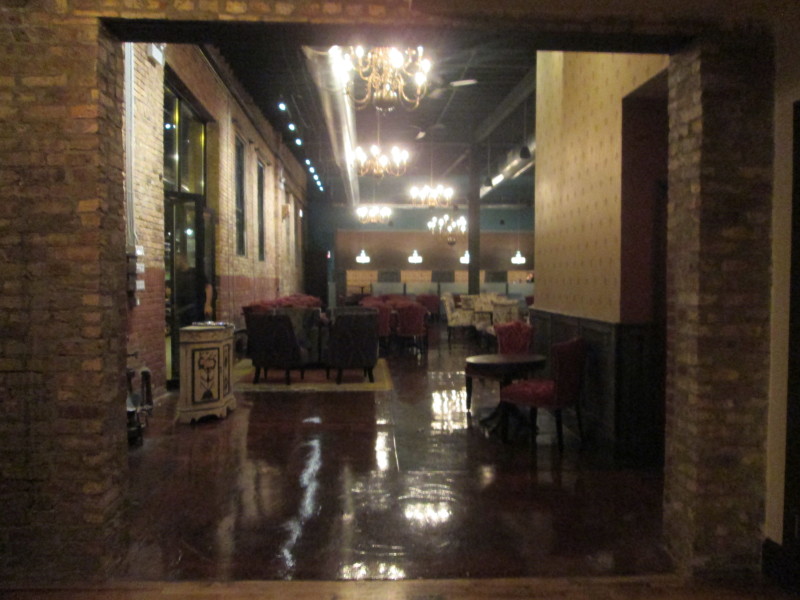
GDB: Do you foresee any pushback with people trying to wrap their head around a more fine dining experience with beer, as opposed to wine pairings or 80 year old scotches?
Michael: They’ll get used to it. But that’s the thing, it’s a newer concept. For me, back when I was a bread baker I used to go home, and I’d pick up a Belgian beer and I’d cook something. A simple roast chicken, maybe some sautéed mushrooms, add some chicken salt to that, little butter, and that would be it. I’d have a Belgian beer of some sort, whatever I liked at the time, and it was awesome.
How this concept started was, why doesn’t everybody do that in general? It’s kind of a European thing, where you don’t have chicken fingers and fries for every meal, or hamburgers for that matter all the time. It was food. Or I guess what I call food. [laughs] I don’t know, it’s weird, that was the best way to explain that part of it. I’d have these things and it was great. The whole thing was like, “Why doesn’t anybody make this? Why can’t I get that somewhere?” And it was like, I can do that, so why not?
That was one of the original things that spawned this. Then again, doing things at Half Acre helped like, “Alright, I can brew beer.” Then I had to do things for Next restaurant at that point from [Alinea GM] Joe Catterson, the great Joe Catterson, who asked me, “You make a beer. Can you make us a beer for this?” I’m like, “Yeah. I’ll try, why not?” [laughs]
So, it continued to steamroll into what became this.
GDB: You probably could’ve done something similar just by opening up a production brewery, and then just offering food pairings. Why a brewpub instead a full on brewery?
Michael: I like this environment more. To me, I like the restaurant environment. We have been in it for so long. I hate packaging. Yeah. It’s a drag. I like making beer, I like tending to it.
GDB: That’s when it feels like it’s a factory? Packaging?
Michael: Yeah. That definitely factors in. People say, “Are you going to bottle and stuff like that?” It’s never my favorite part. But I love the kitchen part of it, being a part of it, seeing all of it. That’s more my speed.
I hate packaging. Yeah. It’s a drag.Michael Carroll
GDB: How did you land on this place? Did you want to be in this neighborhood, in this ward, on the Ravenswood Corridor, all of that?
Michael: Not specifically, [but] we’ve had this space pinned down for at least three years. We looked all over the city. We looked down in Randolph Street area, a couple places we looked at down there. We looked at Pilsen, looked at Logan Square. I’ve always loved this neck of the woods in general. I used to live up in Andersonville, so I’ve always liked this north section. We were looking around, we were looking at the space in the corner next to the Chase across from the Mariano’s, that’s still available.
We were looking it over, and we look at this blank building and like, “What’s that?” It had a tiny, dirty “For Rent” sign on the front, and “For Lease” on the front of it. They were like stable doors. It was covered up, and we’re like, “Well, what’s that?” We called them up. They were like, “We’re not really renting it. It’s just a warehouse. We’re like, “Can we rent it?”
[laughter]Michael: Because it had all the space. The whole layout was cool. We were looking for a big open space, a little more fun, little more lively, little more interesting. Otherwise you get too many spaces that were just sort of cigarette box, thin and long.
For a brewery it’s kind of hard, for restaurant it’s kind of hard, because everything just gets bottlenecked, and it’s tight.
GDB: And it’s hard to brew.
Michael: Yeah. We’re like, it would be great if we had a space a little more open, taller ceilings would be great. Then we found this and felt, “This is it.” It’s perfect.
It worked out well to where we could do basically what we wanted to do in it. We have a big kitchen, it’s overly large. We did that purposely because working in kitchens for 20 years, like, have a nice space in the kitchen guys, because it sucks. You always have these cramped spaces and it’s never a good work environment. So, you try to keep people a little bit happier, staff‑wise anyway.
The brewery is 1000 square feet, not crazy, but nice and easy, everything is easy to get to, it’s all in a line. Not all cramped in a corner. We’re here 16 hours a day, so might as well make it nice.
Band of Bohemia is located at 4710 N. Ravenswood, steps from the Metra stop and two blocks from the Damen Brown Line stop. This interview has been edited and condensed.
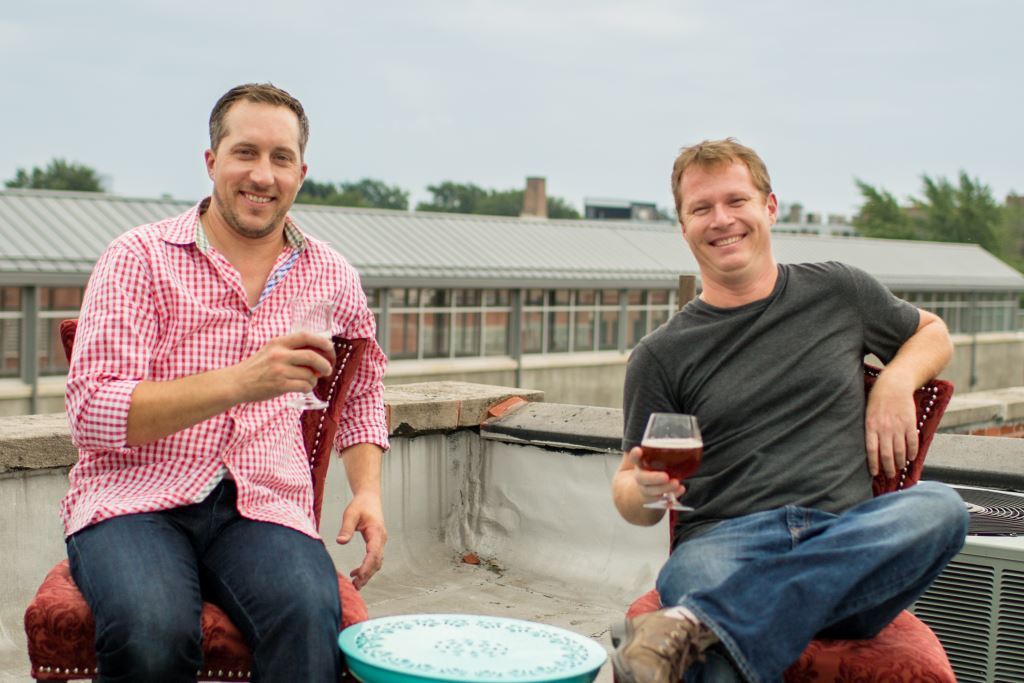
Credit: Pamela Draves Photography